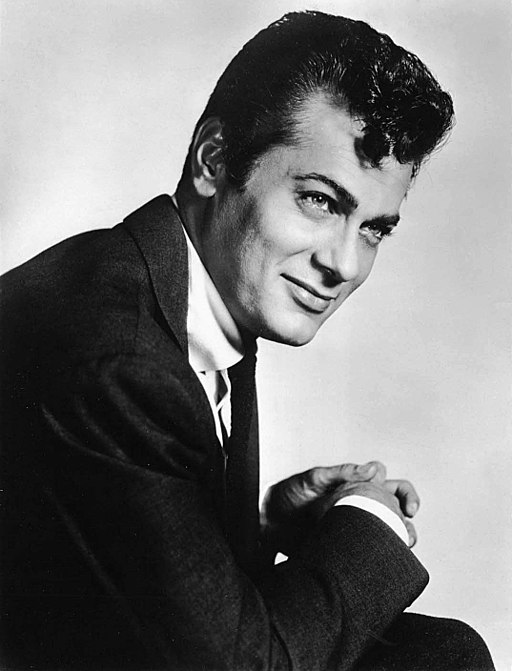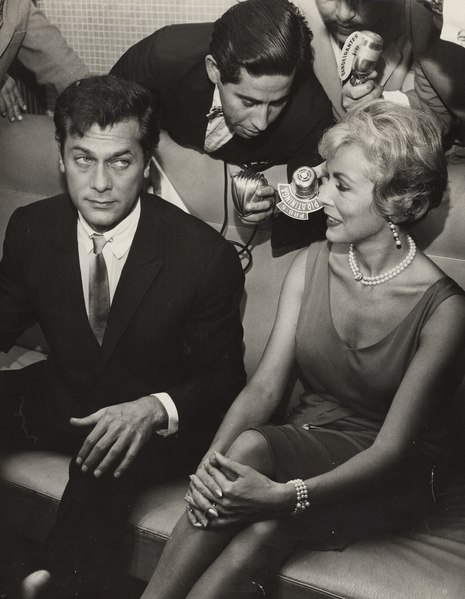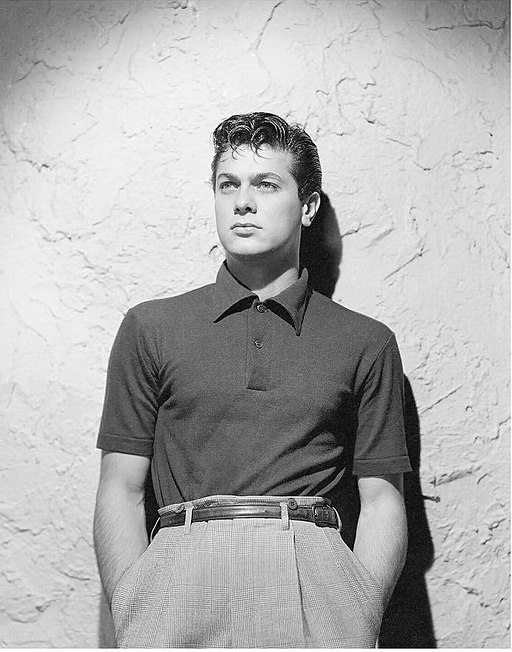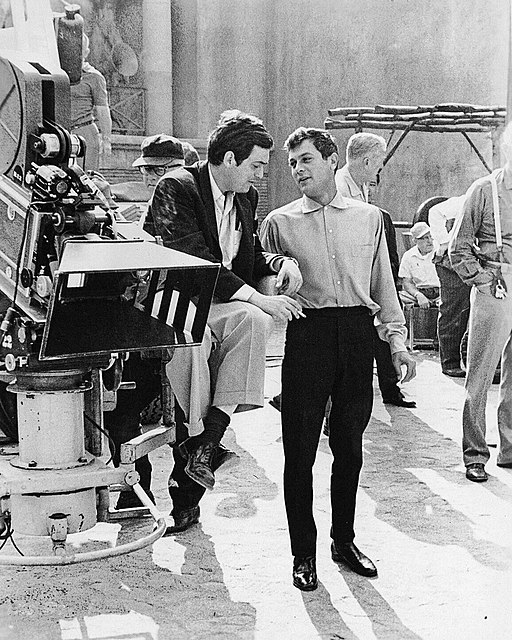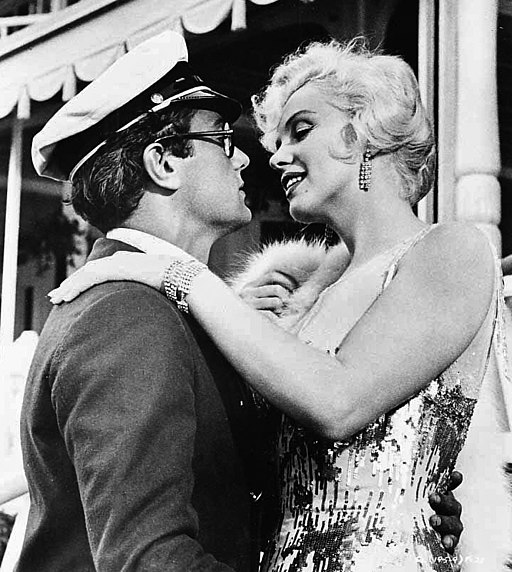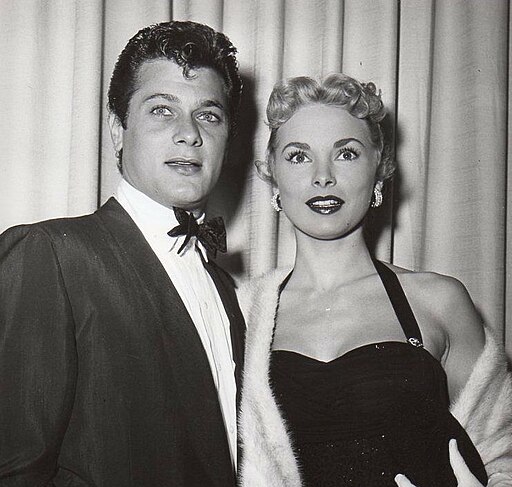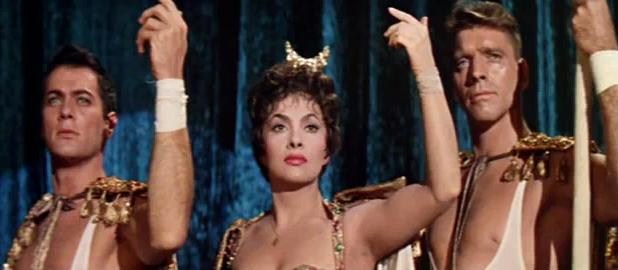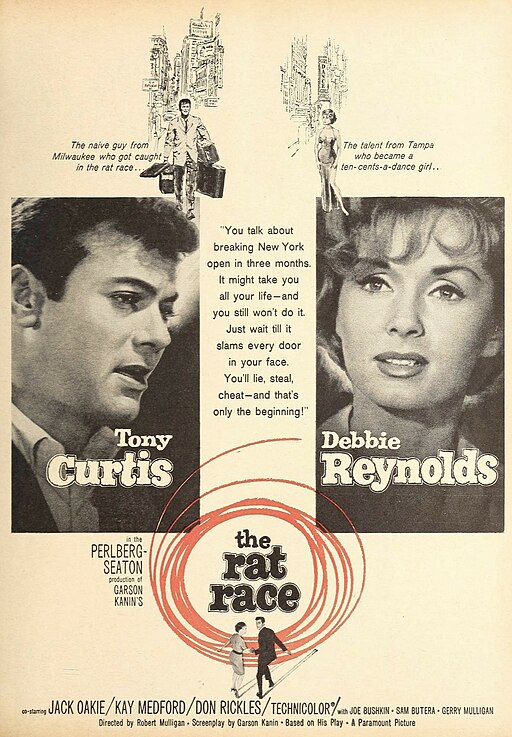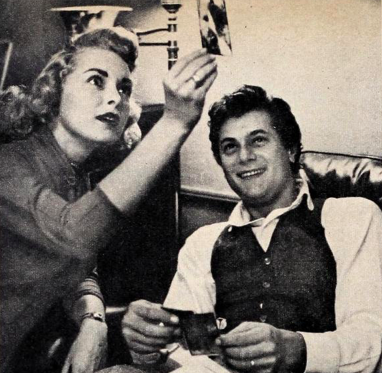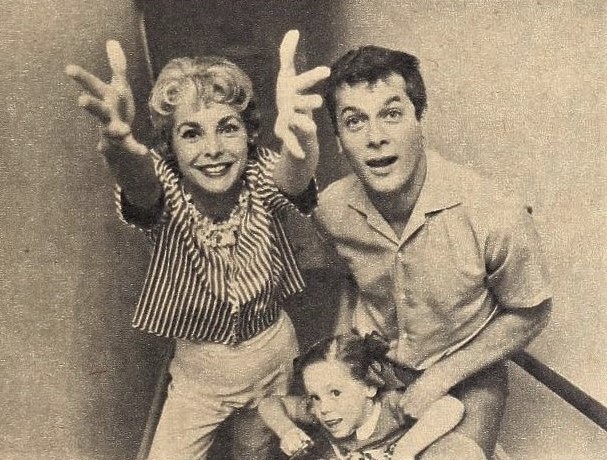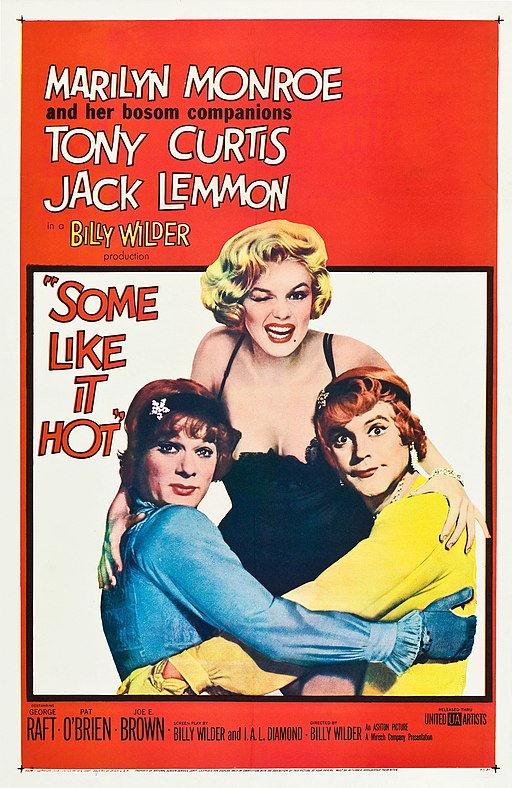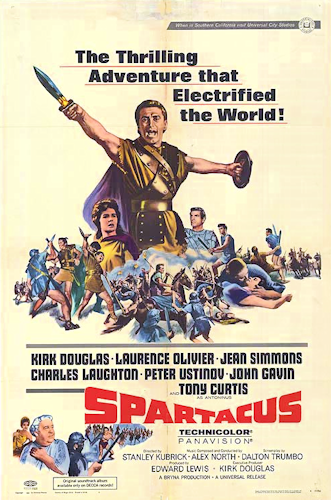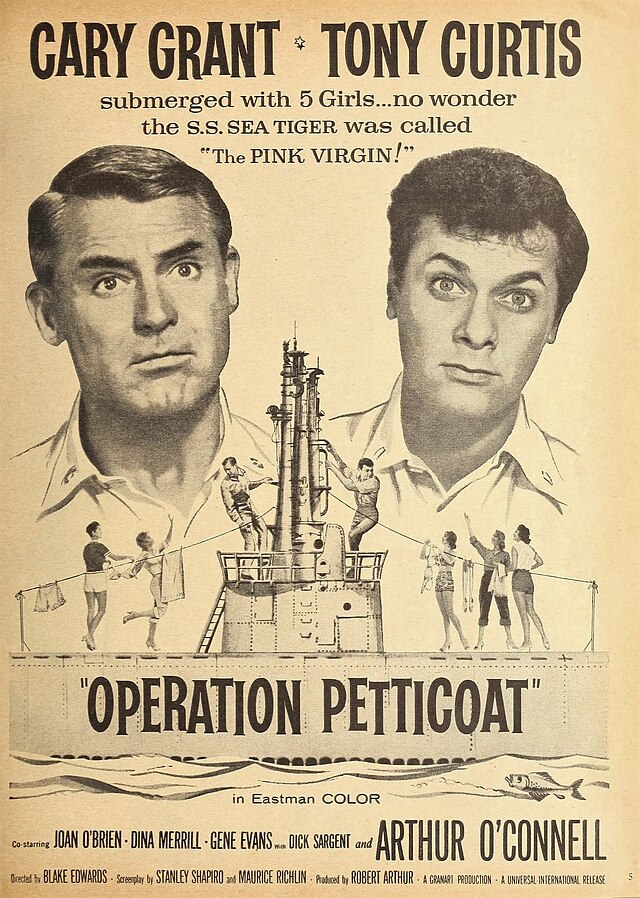Tony Curtis
back| Full Name | Bernard Schwartz |
| Stage Name | Tony Curtis |
| Born | June 3, 1925 |
| Birthplace | The Bronx, New York City, U.S. |
| Died | September 29, 2010 |
| Buried | Palm Memorial Park, Green Valley, Nevada, U.S. |
| Married to | Janet Leigh (1951–1962) - Christine Kaufmann (1963–1967) - Leslie Allen (1968–1982) - Andrea Savio (1984–1992) - Lisa Deutsch (1993–1994) - Jill Vandenberg (1998 until his death in 2010) |
| Children | Kelly Curtis, Jamie Lee Curtis (both with Janet Leigh), Alexandra (with Christine Kaufmann), Allegra (with Leslie Allen), Nicholas Curtis (with Leslie Allen, deceased) |
| Notable films | Some Like it Hot (1959) - Spartacus (1960) - The Defiant Ones (1958) - Operation Petticoat (1959) - Houdini (1953) - The Great Race (1965) |
Tony Curtis
The Bronx Charmer
Tony Curtis, born Bernard Schwartz on June 3, 1925, in the Bronx, New York, was a notable American actor whose career spanned six decades.
His most celebrated performances include the classic comedies "Some Like It Hot" (1959) and "The Great Race" (1965), as well as dramatic roles in "The Defiant Ones" (1958), earning him an Academy Award nomination, and "Sweet Smell of Success" (1957).
Curtis's personal life was equally eventful, marked by six marriages, including one to actress Janet Leigh, and fatherhood to actresses Jamie Lee and Kelly Curtis.
Tony Curtis was often affectionately known as the "Bronx Charmer," a nickname that encapsulates both his origins and his on-screen persona. This moniker reflects his humble beginnings in the Bronx, New York, and his charismatic presence that won over audiences worldwide.
Related
Tony Curtis
Biography and Analysis of his Movie Career
Early Life and Career Beginnings
Bernard Schwartz, later known as Tony Curtis, was born to Hungarian-Jewish immigrants in the Bronx, New York. He grew up in a difficult environment, marked by poverty and a rough neighborhood. His interest in acting developed early, and after serving in the Navy during World War II, he pursued this passion.
Rise to Stardom
Curtis's breakthrough came in the late 1940s when he signed with Universal Pictures. He quickly became a popular actor in the 1950s, known for his handsome looks and versatility. His roles ranged from light comedies to serious dramas.
Critical Acclaim and Notable Performances
Curtis received critical acclaim for his performances in several films. His role in "The Defiant Ones," where he played a prisoner chained to Sidney Poitier, earned him an Academy Award nomination. His comedic talents shone in "Some Like It Hot," alongside Marilyn Monroe and Jack Lemmon.
Personal Life
Tony Curtis's personal life was as colorful as his professional one. He married six times, with his marriage to actress Janet Leigh being the most notable. They became one of Hollywood's iconic couples and were the parents of actresses Jamie Lee Curtis and Kelly Curtis.
Later Years and Legacy
In his later years, Curtis turned to painting, another passion of his, and became a successful artist. He continued acting in films and television but also authored books about his life and career. Curtis passed away in 2010, leaving behind a rich legacy in film and a lasting impact on Hollywood.
Analysis of the Acting Style of Tony Curtis:
Tony Curtis's acting style was marked by a unique blend of charisma, versatility, and a natural flair for both drama and comedy. Here's an analysis of his distinctive approach to acting:
Charismatic Screen Presence
- Charm and Looks: Curtis was initially noticed for his matinee idol looks. His handsome appearance and smooth charm were significant assets, especially in his early career.
- Confidence: He exuded a natural confidence on screen, which helped him in both dramatic and comedic roles.
Versatility and Range
- Dramatic Roles: In films like "The Defiant Ones" and "The Boston Strangler," Curtis displayed a keen ability to handle serious and complex roles. He was able to delve into deep, often troubled characters, showing a range that went far beyond his early typecast roles.
- Comedic Timing: Films like "Some Like It Hot" showcased his impeccable comedic timing. His ability to handle verbal and physical comedy was remarkable, contributing to the enduring appeal of his comedic performances.
Method Acting Influences
- Adaptability: Though not strictly a method actor, Curtis showed adaptability in his method, often immersing himself in his characters. His performances displayed an understanding of the nuances and motivations of his roles.
- Collaborative Nature: Curtis worked well with other actors, often enhancing his performances. His chemistry with co-stars like Jack Lemmon and Marilyn Monroe in "Some Like It Hot" is a testament to this.
Screen Adaptability
- Transition Across Eras: Curtis managed to transition from the classic Hollywood era to more modern filmmaking, adapting his style to fit different types of storytelling and production.
- Genre Fluidity: He effortlessly moved between genres, from action and romance to drama and comedy, demonstrating a broad skill set.
Legacy and Influence
- Innovative Performances: His role in "The Defiant Ones" was groundbreaking for its time, addressing racial issues. Similarly, his cross-dressing role in "Some Like It Hot" challenged gender norms and showcased his willingness to take on unconventional roles.
- Influence on Future Actors: Curtis's style, especially in comedies, influenced future generations of actors. His ability to balance charm, wit, and depth in his roles has been a template for many.
Tony Curtis as Painter
Tony Curtis's career as a painter is a fascinating aspect of his artistic life, showcasing a different side of his creativity beyond his acclaimed acting career.
Beginnings in Art
- Late Start: Curtis began painting in the mid-1980s, finding in art a new form of expression and a way to cope with personal challenges, including substance abuse and the tragic loss of his son, Nicholas.
- Self-Taught Talent: Primarily self-taught, Curtis developed his style through experimentation and a passionate engagement with the process of painting.
Style and Influences
- Abstract and Figurative: His art ranged from abstract works to more figurative pieces, often characterized by bold colors and vibrant compositions.
- Influence of Matisse: Curtis was notably influenced by the works of Henri Matisse. He admired Matisse’s use of color and incorporated similar elements into his own work.
Recognition and Exhibitions
- Global Exhibitions: Curtis’s paintings were exhibited worldwide, including in the United States, France, and Hungary. His work gained considerable attention and was well-received in the art community.
- Art as a Second Career: While initially seen as a hobby, painting quickly turned into a second career for Curtis. He dedicated a significant portion of his later life to his art.
Personal Significance
- Therapeutic Outlet: For Curtis, painting was not just an artistic endeavor but also a therapeutic outlet. It provided him a way to express emotions and experiences that were difficult to articulate in words.
- Connection to Heritage: His art also sometimes reflected his heritage and experiences as the son of Hungarian immigrants.
Legacy in Art
- Art Collections: Curtis's artworks have found places in private collections and galleries, signifying his success as an artist.
- Continued Interest: Even after his passing, there remains a continued interest in his art, with exhibitions and sales continuing to showcase his work.
In summary, Tony Curtis's venture into painting was more than a pastime; it was a profound journey of self-expression and healing. His success in this field highlights his versatility and depth as an artist, transcending his identity as a Hollywood star and revealing a deeply personal and passionate side of his creativity.
Memorable Quotes from Tony Curtis:
Tony Curtis, known for his charm and wit, left behind a legacy of memorable quotes both from his films and his personal insights. Here are some notable ones:
From His Films
- "Some Like It Hot" (1959): In one of his most famous roles, Curtis, dressed in drag, delivers the line, "I'm a man!" to which Joe E. Brown famously replies, "Well, nobody's perfect." This closing line from the film is one of the most celebrated in movie history.
- "The Defiant Ones" (1958): Playing a chained-together convict alongside Sidney Poitier, Curtis delivers impactful lines that reflect the racial tensions and mutual dependence of the characters, such as, "You listen, and you listen good! I'm just as sick of you as you are of me!"
Personal Quotes
- On His Career: "I've made 122 movies, and I daresay there's a picture of mine showing somewhere in the world every day."
- On Acting: "It was more important to be recognized as an actor than to be rich and famous."
- Reflecting on His Life: "I wouldn't be caught dead marrying a woman old enough to be my wife."
- About Marilyn Monroe: Reflecting on his time working with Marilyn Monroe in "Some Like It Hot," he famously quipped, "Kissing Marilyn Monroe was like kissing Hitler." This was often interpreted as a comment on the challenges of working with Monroe at that time.
- On Stardom: "You know, you're really nobody in LA unless you live in a house with a really big door."
Tony Curtis Trivia:
How Tall was Tony Curtis?
Tony Curtis was approximately 5 feet 9 inches (175 cm) tall. His height, combined with his charismatic screen presence and good looks, contributed to his success and appeal as a leading man in Hollywood.
Was Tony Curtis Jewish?
Yes, Tony Curtis was Jewish. Born Bernard Schwartz, he was the son of Hungarian-Jewish immigrants. His Jewish heritage played a significant role in his early life, particularly growing up in a multicultural neighborhood in the Bronx, New York.
This background also influenced his perspectives and experiences in Hollywood, especially during a time when anti-Semitism was prevalent in the United States. Despite changing his name for his acting career, a common practice at the time for many Jewish performers seeking to broaden their appeal, Curtis remained connected to his Jewish roots throughout his life.
Controversies about Kim Novak accusing Tony Curtis
Kim Novak, a prominent Hollywood actress, made a serious accusation in 2021 against Tony Curtis, claiming that he spiked her drink at a party. According to Novak, this incident occurred at a gathering in 1958. She recounted waking up feeling dazed and naked after the event, believing that Curtis was responsible for spiking her drink. This accusation came to light many years after Curtis's passing in 2010.
It's important to note that this allegation surfaced decades after the supposed incident, and Curtis, who passed away in 2010, was not able to respond to the claim. This accusation forms a part of the complex and often controversial history of Hollywood's past, where many incidents of this nature have come to light in recent years, especially with the advent of movements like #MeToo.
The details of the alleged incident remain largely based on Novak's account, and there is limited information available to fully understand the context or corroborate the specifics of her claims. The incident reflects the broader issues of the film industry's past, where many actors and actresses have come forward with similar accusations, shedding light on the darker aspects of Hollywood's history.
Significance of “The Defiant Ones” for Tony Curtis’ career:
Tony Curtis's role in "The Defiant Ones" (1958) was a significant milestone in his career for several reasons:
Break from Typecasting
- Dramatic Departure: Prior to "The Defiant Ones," Curtis was often cast in roles that capitalized on his good looks and charm. This film marked a departure from those roles, allowing him to demonstrate his range as a serious actor.
- Complex Character: Curtis played John "Joker" Jackson, a white prisoner chained to a black prisoner (played by Sidney Poitier). The role required a depth of emotion and a nuanced portrayal of a character grappling with racism and survival.
Addressing Social Issues
- Racial Themes: "The Defiant Ones" tackled the issues of racism and segregation head-on at a time when these topics were often avoided in Hollywood. Curtis's decision to take on such a role demonstrated his willingness to be part of socially relevant projects.
- On-Screen Chemistry: The dynamic between Curtis and Poitier was pivotal. Their characters' evolving relationship—from mutual hostility to cooperation and respect—mirrored the changing racial attitudes in America.
Critical Acclaim
- Academy Award Nomination: Curtis received an Oscar nomination for Best Actor for his performance, solidifying his status as a credible dramatic actor.
- Industry Recognition: The film's critical success and multiple award nominations and wins brought Curtis recognition within the industry as a versatile and serious actor.
Impact on Career Trajectory
- Expanded Roles: Following "The Defiant Ones," Curtis was offered more diverse and challenging roles. It broadened his acting opportunities beyond the romantic or light comedic roles he was previously known for.
- Lasting Legacy: The film remains one of Curtis's most critically acclaimed performances and is often cited as a defining moment in his career.
Cultural Impact
- Breaking Barriers: Curtis's role in the film and its success helped in breaking down racial barriers in Hollywood. It showed that interracial films could be both critically and commercially successful.
- Influence on Future Films: "The Defiant Ones" set a precedent for more films that addressed social and racial issues, paving the way for more progressive storytelling in Hollywood.
In summary, "The Defiant Ones" was a career-defining film for Tony Curtis. It showcased his acting skills beyond the typical leading man roles he had been known for and contributed to the discussion and portrayal of critical social issues in cinema. This role not only expanded his artistic repertoire but also left a lasting impact on Hollywood's approach to race and partnership in filmmaking.
Awards and Nominations:
Academy Awards
- 1959: Nominated for Best Actor in a Leading Role for "The Defiant Ones."
BAFTA Awards
- 1959: Nominated for Best Foreign Actor for "The Defiant Ones."
- 1960: Nominated for Best Foreign Actor for "Some Like It Hot."
Golden Globe Awards
- 1958: Nominated for Best Actor – Drama for "Sweet Smell of Success."
- 1959: Won the Henrietta Award for World Film Favorite – Male.
- 1961: Nominated for Best Actor – Comedy or Musical for "The Great Impostor."
- 1969: Nominated for Best Actor – Drama for "The Boston Strangler."
- 1971: Nominated for Best TV Actor for "The Persuaders."
Emmy Awards
- 1978: Nominated for Outstanding Lead Actor in a Limited Series or a Special for "The Third Girl from the Left."
Other Honors
- Hollywood Walk of Fame: Curtis has a star on the Hollywood Walk of Fame at 6817 Hollywood Boulevard for his contributions to the film industry.
- Chevalier of the Ordre des Arts et des Lettres: Awarded by France for significant contributions to the arts.
- Lifetime Achievement Awards: He received several lifetime achievement awards from various film festivals and organizations recognizing his long-standing contributions to cinema.
Reflection on Awards and Legacy
While Curtis's awards list might not be as lengthy as some of his peers, it's important to note the era he was working in and the stiff competition he faced. His performances in films like "The Defiant Ones" and "Some Like It Hot" were highly acclaimed and remain influential in cinema history. His ability to balance leading roles in both dramas and comedies speaks to his versatility as an actor.
Movies featuring Tony Curtis:
1940s
- 1949 - "City Across the River": Curtis's film debut in a story about juvenile delinquency in Brooklyn.
1950s
- 1950 - "Francis": A comedy about a talking mule, where Curtis plays a small role.
- 1950 - "Sierra": A western film where Curtis appears as a cowboy.
- 1950 - "Winchester '73": A classic western starring James Stewart, with Curtis in a minor role.
- 1950 - "Kansas Raiders": Curtis plays Kit Dalton in this story about Quantrill's raiders.
- 1951 - "The Prince Who Was a Thief": An adventure film where Curtis stars as a thief in exotic Persia.
- 1952 - "No Room for the Groom": A comedy with Curtis as a newlywed struggling with his marriage.
- 1952 - "Flesh and Fury": Curtis plays a deaf boxer in this sports drama.
- 1952 - "Son of Ali Baba": In this adventure film, Curtis is in the title role, set in the exotic Middle East.
- 1953 - "Houdini": A biographical film about the famous magician, with Curtis in the lead role.
- 1953 - "Forbidden": A film noir featuring Curtis as a gambler.
- 1954 - "Beachhead": A World War II drama with Curtis as a Marine.
- 1954 - "Johnny Dark": Curtis stars in this car-racing drama.
- 1954 - "The Black Shield of Falworth": A medieval adventure where Curtis plays a squire.
- 1955 - "So This Is Paris": A light comedy featuring Curtis as a Navy sailor.
- 1955 - "Six Bridges to Cross": A crime drama based on the Great Brink's Robbery.
- 1956 - "Trapeze": A circus drama with Curtis as a trapeze artist.
- 1956 - "The Rawhide Years": A western where Curtis plays a gambler.
- 1957 - "Mister Cory": Curtis portrays a bellboy-turned-gambler.
- 1957 - "Sweet Smell of Success": A classic film noir with Curtis as a press agent.
- 1958 - "The Vikings": An epic adventure film set in the Viking Age.
- 1958 - "Kings Go Forth": A World War II drama about racial prejudice.
- 1958 - "The Defiant Ones": A groundbreaking film about two escaped convicts, one white and one black, chained together.
- 1959 - "The Perfect Furlough": A romantic comedy with Curtis as a soldier.
- 1959 - "Some Like It Hot": A classic comedy where Curtis and Jack Lemmon disguise themselves as women.
- 1959 - "Operation Petticoat": A World War II comedy with Curtis as a submarine officer.
1960s
- 1960 - "Who Was That Lady?": A comedy featuring Curtis as a cheating husband.
- 1960 - "Spartacus": The epic historical drama directed by Stanley Kubrick, with Curtis in a supporting role.
- 1960 - "The Rat Race": A drama about the harsh realities of New York City.
- 1961 - "Pepe": A cameo appearance in this comedy film.
- 1961 - "The Great Impostor": Curtis plays a real-life impostor who assumed various identities.
- 1962 - "Taras Bulba": A historical drama set in the 16th century Ukraine.
- 1962 - "40 Pounds of Trouble": A comedy where Curtis runs a casino.
- 1964 - "Paris When It Sizzles": A cameo role in this romantic comedy.
- 1964 - "Goodbye Charlie": A comedy about reincarnation and gender swapping.
- 1964 - "Sex and the Single Girl": A romantic comedy with Curtis as a journalist.
- 1964 - "Wild and Wonderful": A comedy where Curtis plays the owner of a French poodle.
- 1965 - "The Great Race": A slapstick comedy set in an early 20th-century car race.
- 1966 - "Boeing Boeing": A comedy based on a play, with Curtis as a journalist juggling relationships.
- 1966 - "Chamber of Horrors": A cameo appearance in this horror film.
- 1966 - "Not with My Wife, You Don't!": A romantic comedy about a love triangle.
- 1966 - "Arrivederci, Baby!": A dark comedy where Curtis plays a womanizer.
- 1967 - "Don't Make Waves": A comedy set in Southern California.
- 1967 - "On My Way to the Crusades, I Met a Girl Who...": A historical comedy.
- 1968 - "The Boston Strangler": A dramatic turn for Curtis, playing the infamous serial killer.
- 1968 - "Rosemary's Baby": A cameo in this classic horror film.
- 1968 - "Those Daring Young Men in Their Jaunty Jalopies": A comedy sequel to "The Great Race".
- 1969 - "You Can't Win 'Em All": An adventure film set in Turkey during the 1920s.
1970s
- 1970 - "Suppose They Gave a War and Nobody Came": A comedy-drama about military men and small-town life.
- 1970 - "You Can't Win 'Em All": An action film set in the 1920s Turkey, where Curtis plays a mercenary.
- 1971 - "The Persuaders!": A TV series where Curtis stars alongside Roger Moore as a playboy solving crimes.
- 1975 - "Lepke": A biopic where Curtis plays mob boss Louis 'Lepke' Buchalter.
- 1976 - "The Last Tycoon": A drama based on F. Scott Fitzgerald's novel, featuring Curtis in a supporting role.
- 1977 - "Casanova & Co.": A historical comedy with Curtis as the legendary lover Giacomo Casanova.
- 1977 - "Sextette": A musical comedy where Curtis plays an ex-husband of a movie star.
- 1978 - "The Bad News Bears Go to Japan": A sports comedy film, with Curtis managing a little league team.
- 1978 - "The Manitou": A horror film based on a novel, with Curtis playing a psychic.
- 1979 - "Title Shot": A crime drama about a boxer involved in a kidnapping.
1980s
- 1980 - "Little Miss Marker": A comedy-drama based on a Damon Runyon story.
- 1980 - "It Rained All Night the Day I Left": A comedy film featuring Curtis in a leading role.
- 1981 - "The Million Dollar Face": A made-for-TV drama film.
- 1982 - "Othello, the Black Commando": A modern military-themed adaptation of Shakespeare's play.
- 1982 - "BrainWaves": A sci-fi thriller about a woman who receives a brain implant.
- 1982 - "Balboa": A drama film set in a Californian resort.
- 1983 - "Where Is Parsifal?": A comedy film featuring Curtis in a leading role.
- 1984 - "The Fantasy Film Worlds of George Pal": A documentary where Curtis appears as himself.
- 1985 - "Insignificance": A film that brings together Marilyn Monroe, Joe DiMaggio, Albert Einstein, and Senator Joe McCarthy, played by Curtis.
- 1986 - "Club Life": A drama set in the world of nightclubs.
- 1986 - "The Last of Philip Banter": A drama about a man experiencing premonitions.
- 1989 - "Lobster Man from Mars": A comedy film, a spoof of B-movie sci-fi films.
1990s
- 1990 - "Midnight": A thriller where Curtis plays a retired cop who is a radio talk show host.
- 1992 - "Center of the Web": An action thriller featuring Curtis in a supporting role.
- 1993 - "Naked in New York": A romantic comedy where Curtis makes a cameo appearance.
- 1993 - "The Mummy Lives": A horror film with Curtis playing the lead role of a revived Egyptian mummy.
- 1994 - "A Century of Cinema": A documentary about the history of film, with Curtis appearing as himself.
- 1995 - "The Immortals": A crime action film where Curtis plays a gangster.
- 1996 - "Roseanne": Appearing in an episode of the popular TV sitcom.
- 1997 - "Stargames": A low-budget science fiction film.
- 1998 - "Louis & Frank": A comedy film featuring Curtis in a supporting role.

